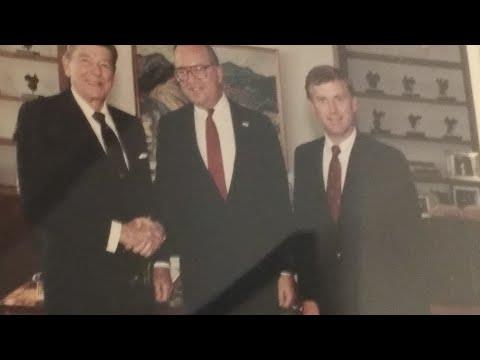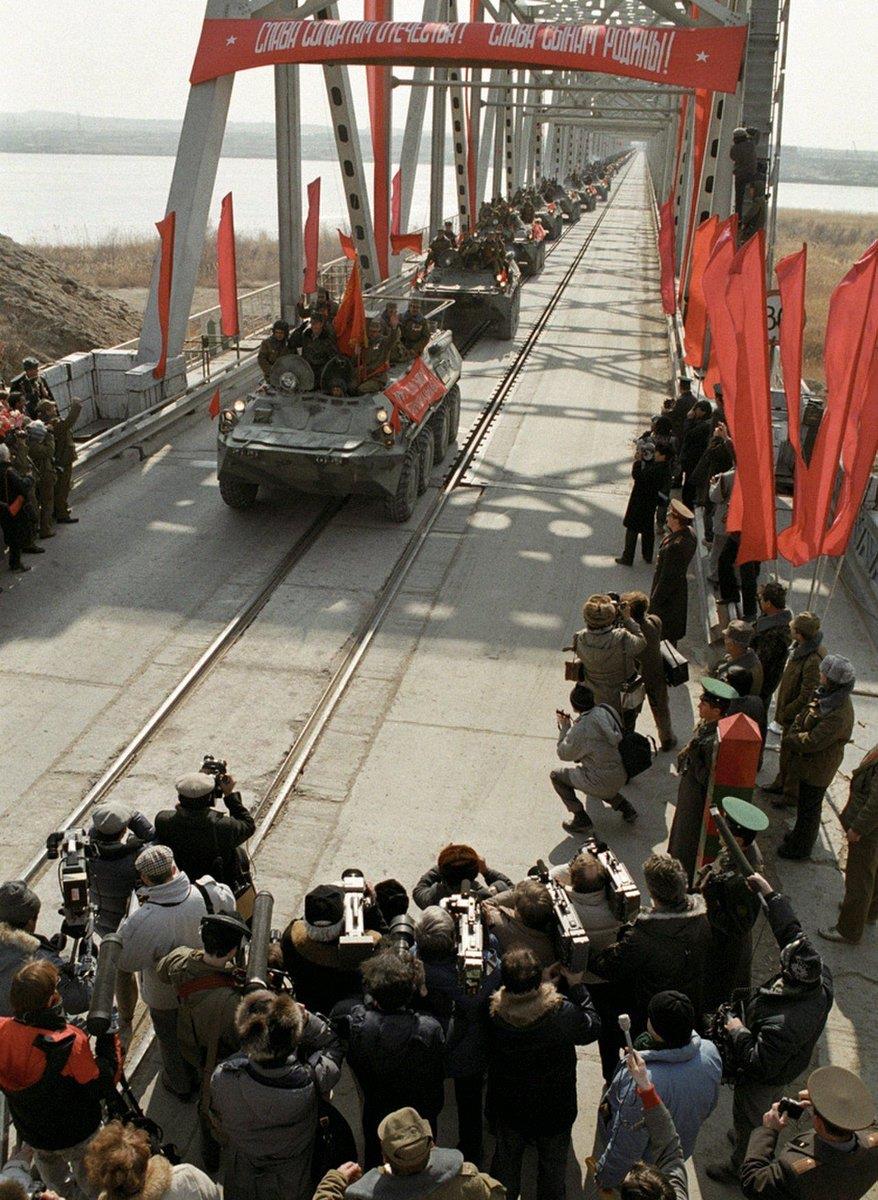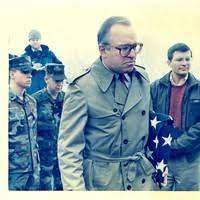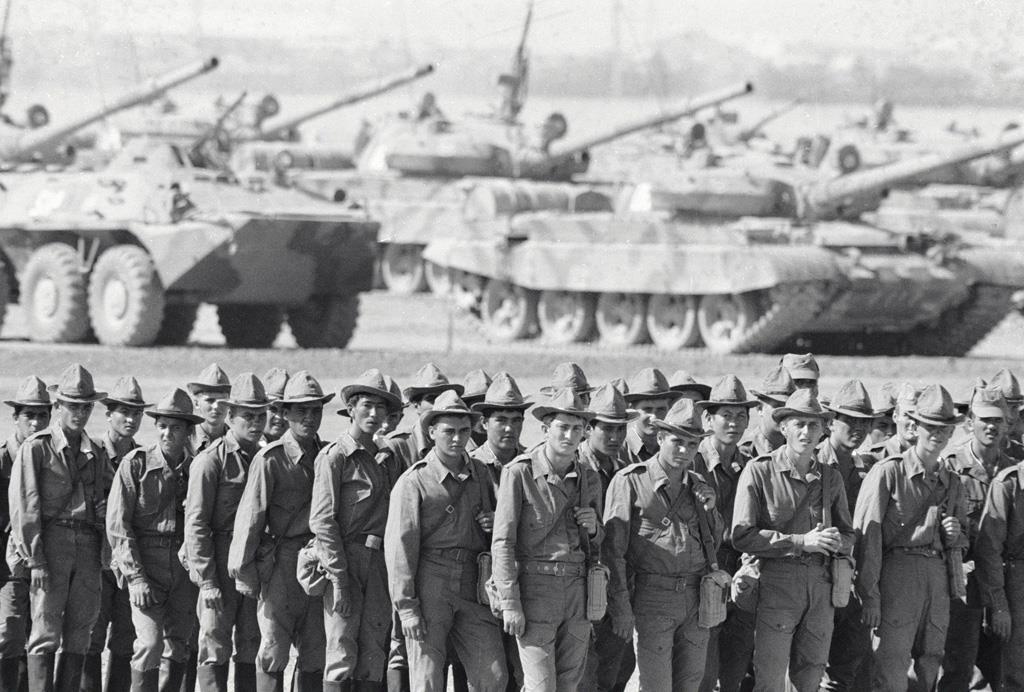
The Last American In Kabul
The unsung hero of America's victorious covert war – aka“Charlie Wilson's War” – in defeating the Soviet military during their occupation of Afghanistan between 1979 and 1989 is a career US Foreign Service officer, retired ambassador Jon D Glassman.

Acting ambassador to Afghanistan (1987-89) Jon D Glassman during the Soviet occupation speaks to Capitol Intelligence/CI Ukraine using CI Glass during an interview with Capitol Intelligence Group – Turning Swords into Equity on August 14, 2022, in Olney, Maryland
Glassman's leadership as chief of mission at the US Embassy in Kabul from 1987 to 1989 played a key part in orchestrating the humiliating defeat of the Soviet military, immortalized by the picture of Russian troops crossing the Hairatan Bridge toward the Uzbek SSR on February 15, 1989, under Soviet leader Mikhail Gorbachev.

Russlan military crossing Hairatan Bridge into Uzbekistan during Russian withdrawal on February 15, 1989. Photo: © A Solomonov / . Соломонов
While the heroes in the 2007 film Charlie Wilson's War, such as maverick US congressman Wilson himself and Greek-American CIA agent Gust Avrakotos , gained worldwide fame from their portrayals by Tom Hanks and the late Philip Seymour Hoffman, it was Jon D Glassman who was on streets of Kabul and the provinces, pipelining actionable political, diplomatic and military insights to the US State Department and the White House under Jimmy Carter and then Ronald Reagan.
While the supply of arms and logistics of feeding them to the Afghan mujahideen were managed by the Central Intelligence Agency out of Islamabad, Glassman was a US State Department diplomat operating in the belly of the beast, Kabul.
“[CBS News anchor] Dan Rather and Charlie Wilson put one foot in Afghanistan; I was walking the streets of Kabul talking to Afghans,” Glassman said in an interview with Capitol Intelligence Group – Turning Swords into Equity in his home in the DC suburbs of Maryland. This is the first print and televised interview ever granted by Glassman on his time in Afghanistan.
During the day, Glassman would spend his time talking to Afghans and managing his team reporting on Russian troop maneuvers by driving between tanks while in the evening imbibing endless quantities of vodka with Russian and Warsaw Pact diplomats.
But Glassman's time in Kabul during the successful covert war initiated by Zbigniew Brzezinski, the Polish-born national security adviser under Carter, is an extremely relevant example for all those working to defeat the Russian military after Moscow's bloody invasion of Ukraine on February 25, 2022.
The Soviets did not expel or assassinate Glassman, which speaks volumes on the deep-seated Russian fear of engaging in any direct military conflict with the United States, considering Glassman and his embassy staff were providing critical support to the mujahideen and the great rebel leader Ahmad Shah Massoud in the fight against the occupation.
The last time the US military directly engaged with the Russian military was in Syria, when US special forces ended up killing between 300 to 600 members of Wagner , the private Russian mercenary group now actively fighting in Ukraine.
Blinken's failureIt is too early to calculate how many innocent lives could have been saved, or if the Russian invasion could have been avoided altogether, if US Secretary of State Antony Blinken had studied and learned from Glassman's time in Kabul by not closing the US Embassy in Kiev at the outset of the Russian invasion.
Washington Post foreign-affairs columnist Josh Rogin has said it is widely expected that Blinken will be fired by President Joe Biden after the midterm elections in November and replaced by US Senator Chris Coons of Delaware.
Former US ambassador to Moscow and now CIA director Bill Burns is leading the new“Charlie Wilson's War,” helping to inflict unprecedented casualties against Russian military and general staff. The decades of war in Afghanistan and Iraq, including changes by then-director General David Petraeus, has militarized the CIA to a point not seen since the height of the Vietnam War.
Diplomatic heroismGlassman also noted that no one should be surprised by the completely irrational and senseless invasion of Ukraine by Russian President Vladimir Putin, as it is only a repeat of the irrational and pointless invasion of Afghanistan by Leonid Brezhnev in 1979, and the Cuban missile crisis under Nikita Khrushchev in 1962.
Glassman, for his part, is hopeful that Russians themselves will force out Putin and the half-dozen Rasputin-like mafia dons who have taken over the Kremlin.
“If we can take out the five crime families of New York, the Russians can do the same,” Glassman said.
Glassman serves as an example of diplomatic heroism by serving on post during an active conflict, the most critical duty of any emissary and the genesis of diplomacy itself.
The native New Yorker personally volunteered to lead the US Embassy in Kabul in 1987, which had been led at a lower level after US ambassador Adolph“Spike” Dubs was kidnapped and then killed in a gun battle after visiting the US Culture Center in Kabul in February 1979.
Arnold Lewis Raphel, the US ambassador to Pakistan, was killed on August 17, 1988, when the C-130 Hercules military aircraft carrying himself and Pakistan's military leader, President Muhammand Zia
- Haq , and 34 other passengers allegedly crashed shortly after taking off from a Pakistani airport.
However, Glassman said in the interview that the Russian ambassador to Kabul at the time, Nikolai Yegorychev, had implied during an unprecedented visit to the US Embassy in Kabul that the plane may have been destroyed by“patriotic forces” of the puppet Afghan communist regime.
“He [Yegorychev] knew me because I was the only Westerner [in Kabul] who knew Russian. I had a lots and lots of conversations with this guy Yegorychev. He was a lonely man, I was a lonely man, so we talked. So one time he says to me there is a logistics thing, you are giving the stingers stuff [to the mujahideen] and we can't accept this,” Glassman said.
“'I am going to tell you something, some patriot … a loyalist out of Pakistan is going to shoot down one of your supply planes.' So a few weeks, a couple of months go on, and then the plane with Zia
- Haq and Arnie Raphel on board blows up.”
After the destruction of the C-130, Glassman said,“Yegorychev comes to see me and says it is a very bad moment but I want to tell you, that we, the Russians, had nothing to with this…. So I say, what about your allies here [in Afghanistan]? He said I cannot speak for them.
“That was an implicit admission that they [the Russians] were aware of it and they were trying to hand off the blame. The Afghan [government] could not have done it alone without the Soviets being involved. The game they were playing is saying they did it, not I.”
With speculation that the C-130 was destroyed as revenge for Zia's backing the United States against Russia, a joint US-Pakistan investigation was made into the crash, with an official US-Pakistan finding that it was an accident and not an act of hostile fire or sabotage. Glassman's recollection of the meeting with Russian ambassador Yegorychev completely contradicts the official US and Pakistani government findings.

US chief of mission Jon D Glassman taking the US flag after closing the US Embassy in Kabul in 1989 Photo:. ©Jon Glassman
Unlike what happened after last year's fall of Kabul, Glassman took the US flag under his arm from the US Embassy in Kabul in 1989, and handed it to then-president Reagan in victory.
Glassman later became the US ambassador Paraguay at age 47 and then deputy national security adviser to Dan Quayle, the vice-president under George H W Bush.
Peter K Semler is the chief executive editor and founder of Capitol Intelligence. Previously, he was the Washington, DC, bureau chief for Mergermarket (Dealreporter/Debtwire) of the Financial Times and headed political and economic coverage of the US House of Representatives and Senate.

Legal Disclaimer:
MENAFN provides the
information “as is” without warranty of any kind. We do not accept
any responsibility or liability for the accuracy, content, images,
videos, licenses, completeness, legality, or reliability of the information
contained in this article. If you have any complaints or copyright
issues related to this article, kindly contact the provider above.















Comments
No comment